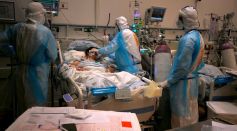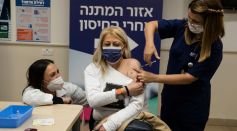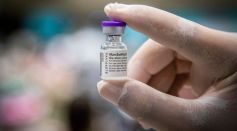Tags: CoViD-19

Intentionally Getting COVID-19 Omicron Isn't A Good Idea; Here's Why Fully Vaccinated People Still Get Coronavirus

COVID-19 Omicron Variant Peaking in Some Parts Worldwide: Why Are Experts Optimistic?

Some People Could Get False Negative Results on Antigen Tests Despite Having Symptoms, Experts Explain Why

Flurona Raises New Concerns on Double Infection of Influenza Virus and Coronavirus: Here's What Science Knows So Far

COVID-19 Omicron Variant Less Severe But More Transmissible, Makes Up More Than 95 Percent of New Cases

How to Overcome Stress, Mental Challenges This Pandemic

First ‘Flurona’ Virus Case Detected in Israel: 2-in-1 Coronavirus and Flu Infection Occurs in Pregnant Woman; Country Initiates Booster Jab for Protection
Top Science Times Stories 2021: Hot Issues, News That Made Headlines This Year

Throat Swabs Better Than Nasal Swabs Among Rapid Tests, Experts Claim

COVID-19 Pfizer, BioNTech, Moderna Vaccines: What Makes mRNA Technology Effective Against the Virus?

Dr. Fauci Suggests Skipping Mass New Year's Eve Celebrations Amid Continuing Increase of Omicron Cases in the US

Obese Patients Who Received Weight Loss Treatments Found with Lower Risks of Developing Severe COVID-19

COVID-19 Omicron Variant Detection Method: Saliva Swabs More Effective, Rapid Tests Not Recommended

COVID-19 Omicron Variant Might ‘Displace’ Delta Variant, South African Studies Show

COVID-19 Protection: No Place for Cloth Masks Amidst the Omicron Variant; Experts Explain Why

Dr. Fauci Says COVID-19 Cases Will Continue to Rise Due to Omicron Variant

Omicron COVID-19 Symptom: Loss of Appetite Might Mean You Are Infected

3 Most Deadly Diseases That Claim Many Lives

Christmas Celebration Amid Spike of Omicron Variant: 7 Ways to Prevent the Spread of COVID-19 During Holidays

3 Tips to Stay Positive When Spending Christmas Day and Holiday Season Alone Amid the COVID-19 Crisis
Most Popular

Can the World Run Out of Water? Water Scarcity Science and Climate Impact Explained

Solar Maximum 2026: Inside the Sunspot Cycle and Solar Activity Forecast Astronomers Are Watching

Volcanic Warning Signs: How Magma Movement Reveals Eruption Prediction Clues for Geologists

Could Technology Prevent Natural Disasters? How Disaster Prediction and Early Warning Systems Could Save Lives





